This month, the panelists participated in the World Day for Consecrated Life by reflecting on the unique scriptural basis of their personal commitment to religious life, as they responded to this question:
In 2022, the World Day for Consecrated Life on Feb. 2 will be celebrated in parishes Feb. 5-6. Could you point to one Scripture passage that underlies your commitment to consecrated life? Which? Why?
______
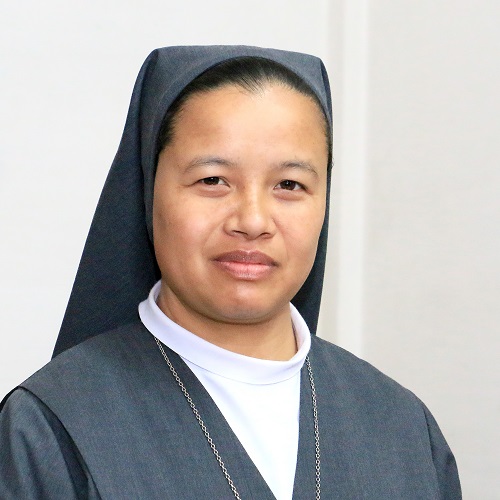 Euginia Laloo of the Jaintia tribe of Meghalaya, India, is a member of the Immaculate Heart of Mary Province (Shillong) of the Institute of the Daughters of Mary Help of Christians (Salesian Sisters of Don Bosco). With a background in media technology and English literature, she has worked in schools, especially with dropout students and in media ministry. Currently, she is writing the history of her province and serving as coordinator of social communication.
Euginia Laloo of the Jaintia tribe of Meghalaya, India, is a member of the Immaculate Heart of Mary Province (Shillong) of the Institute of the Daughters of Mary Help of Christians (Salesian Sisters of Don Bosco). With a background in media technology and English literature, she has worked in schools, especially with dropout students and in media ministry. Currently, she is writing the history of her province and serving as coordinator of social communication.
"Remain in my love" (John 15:9).
Most religious take a motto inspired by the Scripture to live by — I am not any different. In my early childhood, I was struck by Philippians 4:13 — "I can do all things through him who strengthens me." I was in fifth grade when I bagged the first prize in a catechism quiz competition and I was awarded a framed picture with this quotation.
Gradually, this quotation became my favorite — until a turning point in my life when, as a young religious, I entered the last year of my temporary vows. I was preparing for my perpetual vows in 2008, when I heard a strong whisper in my ear: "Remain in my love." This led me from doing to being.
At an annual meeting of all temporary professed sisters of my province, this invitation of Jesus, "Remain in my love," made a special impact on my life during a eucharistic adoration. At that time, I was discouraged, and questioning whether religious life was truly my vocation; I was unsure of what lay ahead of me and was a little disturbed by some comments I heard.
No one had directly spoken to me, or given any sign that I could not go ahead in my vocation — but I could sense something that was trying to block my path. It was during this prayer moment when I was trying to decipher the will of God for my life that I received his reaffirmation to cling to him.
IMG_8544 Laloo CROP.jpg
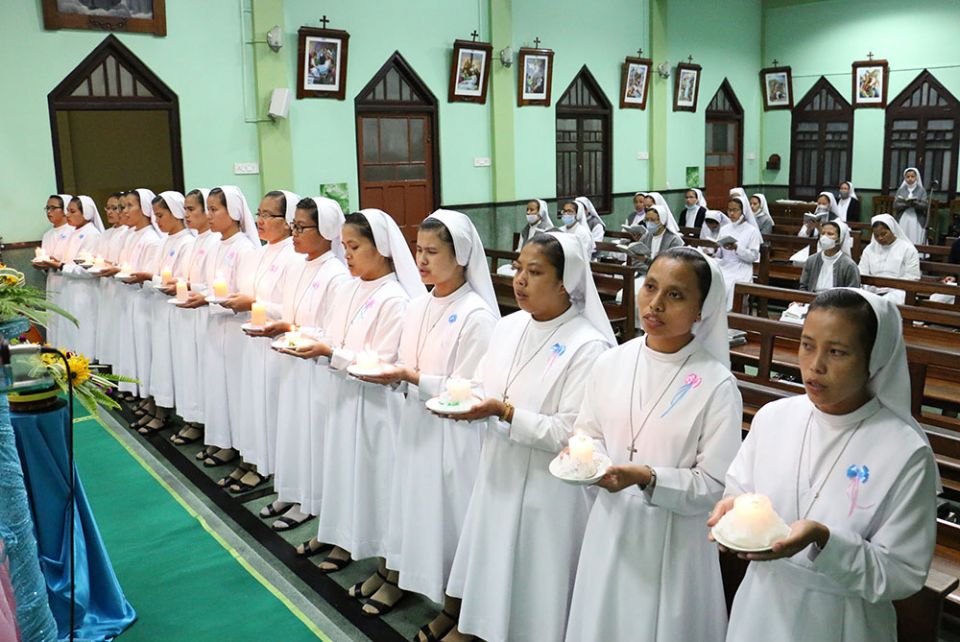
In the midst of storms and clouds, I sensed his presence like a gentle breeze telling me to remain in his love. This word remain makes me think of staying — and what better way is there than to remain in the love of Jesus regardless of all the twists and turns of life?
Since then, I have taken this phrase as my life's principle, and it spurs me on to live the missionary mandate of Jesus: Go proclaim (Mark 16:15).
I find meaning when my action is prompted by love and not by compulsion, for when I act out of love it brings joy to both the giver and receiver. Motivated by the love of God to whom I cling, every burden is a little lighter to bear, and I am inspired to seek the least and the lost, without looking for any recognition, power, name and fame.
As we celebrate the World Day for Consecrated Life 2022 on Feb. 2, I wish every consecrated person the fullness of life and love in Jesus alone. Enjoy, dear friends, the splendor and beauty of remaining in Jesus' love.
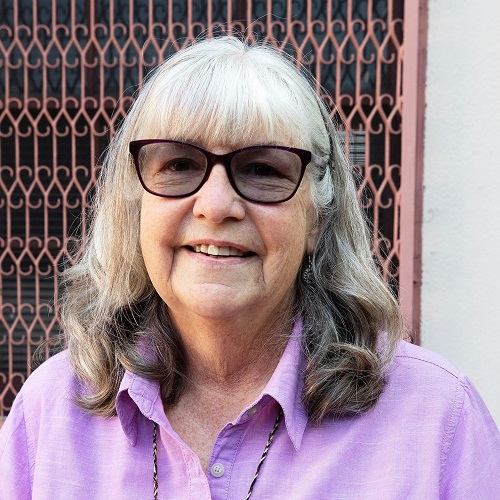 Nancy Uhl is a member of the Sisters of Notre Dame de Namur. A late entrant to religious life, she is a widow, a mother and a grandmother. Before entering, she worked for a free clinic in Los Angeles with a medical health van that served the large homeless population living in downtown Los Angeles. After her entrance, she worked as a pastoral counselor in a parish and eventually became the United States vocation director and now serves on the vocation team.
Nancy Uhl is a member of the Sisters of Notre Dame de Namur. A late entrant to religious life, she is a widow, a mother and a grandmother. Before entering, she worked for a free clinic in Los Angeles with a medical health van that served the large homeless population living in downtown Los Angeles. After her entrance, she worked as a pastoral counselor in a parish and eventually became the United States vocation director and now serves on the vocation team.
Scripture plays an outsize role in a Christian's life. Scripture reminds us just how crazy in love with us God is. Scripture can be a guidebook, giving advice on how to live our lives faithfully. But the best of Scripture inspires. It takes us outside of ourselves. We want to be better.
In each stage of my life, as a married woman, as a mother and as a religious, different Scriptures spoke to me. When I was married, I thought about Joseph fleeing with his little family to Egypt. He demonstrated total fidelity to Mary and the role he was asked to play in the story of salvation. As a mother, I turned to the story of Jesus at the age of 12, disappearing to do his Father's work. Mary and Joseph were frantic. I knew how that felt.
Uhl CROP.jpg
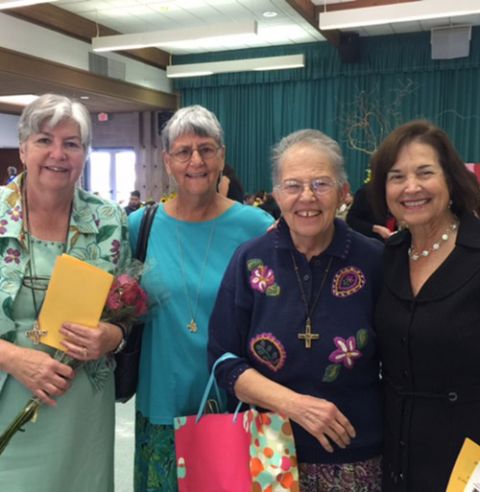
As a religious, I have been inspired by different passages. As a new sister, I took pride in myself when reading about the young rich man who couldn't let go of his possessions. I felt attracted to being the laborer called to bring in the harvest. Now I know that we all are called to be those laborers, no matter the stage of our life. We are all called to total fidelity to our part in salvation history.
The passage in Scripture that especially inspires me today is the story of the poor widow's mite. Jesus says, "But she, from her poverty, has contributed all she had, her whole livelihood" (Mark 12:44). My part of the story is being a member of a congregation of religious sisters, and living out my vows of poverty, chastity and obedience. Do I give all from my poverty or my abundance? Like most religious congregations, we share our material resources with the entire congregation. The vow of poverty is interpreted as living simply.
Am I living up to the example of the poor widow? Our basic needs are met by the congregation. Each of us has a responsibility to not use more than we need and in the way we use the resources of the planet. Are we keeping our carbon footprint as small as we can? This is challenging for an American. There is such abundance in our country. It is easy to fall into the pattern of acquiring.
So, I ponder the story of the poor widow who gave from her poverty. As religious women, we have a responsibility to not take more than we need. By not taking, we are giving. But it does not stop with not taking, we also have to work on solutions to the problems that overconsumption has created. We religious men and women need to be in the forefront of this.
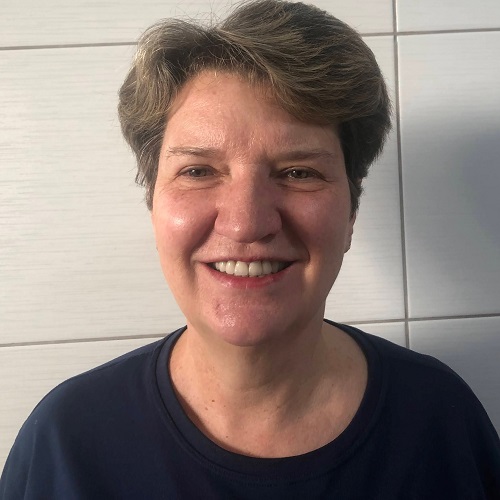 Rita Schneider is a member of the Sisters of the Immaculate Heart of Mary. She is originally from Brazil but worked for two years as a missionary in Haiti and more recently with Brazilian immigrants in the United States. She has an academic background in Portuguese, theology and sociology. Now back in Brazil, she is currently on the leadership team of her province and works on social projects with the poorest communities in south Brazil.
Rita Schneider is a member of the Sisters of the Immaculate Heart of Mary. She is originally from Brazil but worked for two years as a missionary in Haiti and more recently with Brazilian immigrants in the United States. She has an academic background in Portuguese, theology and sociology. Now back in Brazil, she is currently on the leadership team of her province and works on social projects with the poorest communities in south Brazil.
"The Spirit of God is upon me, for he anointed me to proclaim the Good News to the poor!" (Luke 4:18).
This biblical passage continues to inspire my commitment as a religious woman. Even before I entered religious life, I had a desire to give a worthwhile meaning to my life. As a teenager, I watched a video of Mother Teresa of Calcutta and it forcefully ignited in me the desire to serve the poor.
I did not know anyone from Mother Teresa's congregation at that time, but joined the community of the first religious woman I met — a member of the Congregation of the Sisters of the Immaculate Heart of Mary. Since then, I have seen for myself the plight of the poor: first in south Brazil, where I was born and grew up; then in Haiti, where I was even more touched by the reality of poverty; and later in my work with Latino immigrants in the U.S.
Rita1 CROP.jpg
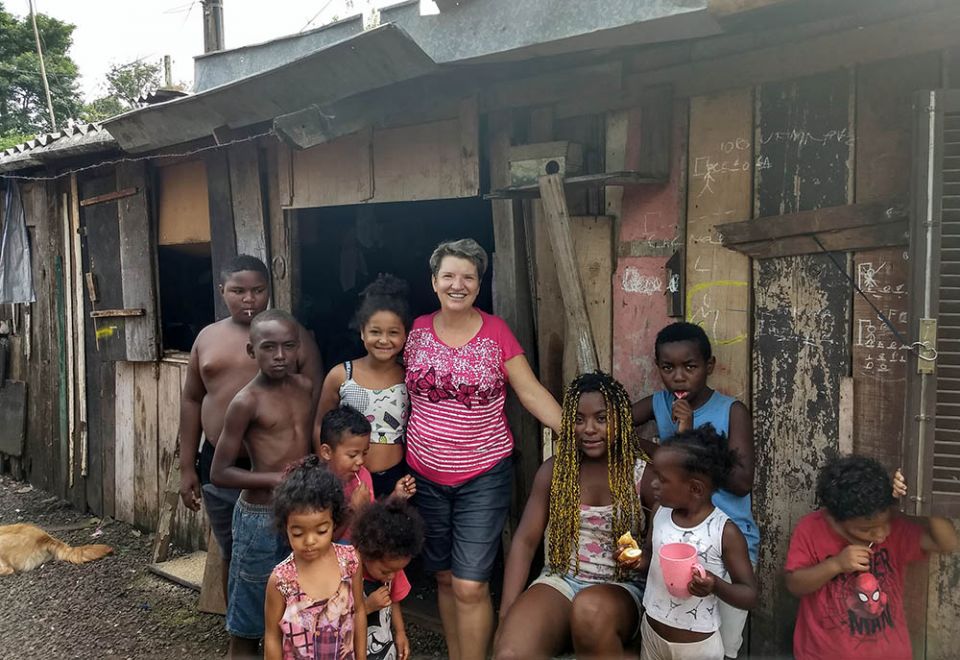
Now, back in Brazil, I am seeing my beloved country falling more deeply into poverty every day.
Consecrated religious life has great potential to meet the cries of reality in a prophetic way, and each of us must commit to that according to our personal and congregational charisms. I always felt a strong appeal to give myself for the cause of the impoverished — especially to answer the cries of poor women. We are strong when we put ourselves at the service of the kingdom of God, and the Holy Spirit inspires and strengthens me at every step along the journey!
We need to learn to be more and more attentive to the signs of the times. The reality of the poor, especially abused women, will always be my mission. We must grow in sisterhood and in sensitivity — to welcome, help, empower and transform the lives of our dear sisters who suffer violence and many other forms of oppression, even in consecrated religious life!
The Holy Trinity strengthens me and helps me dare to face all the challenges involved in rescuing the lives of the poor. This is the way that I continue my mission as a religious woman in the Congregation of the Sisters of the Immaculate Heart of Mary!
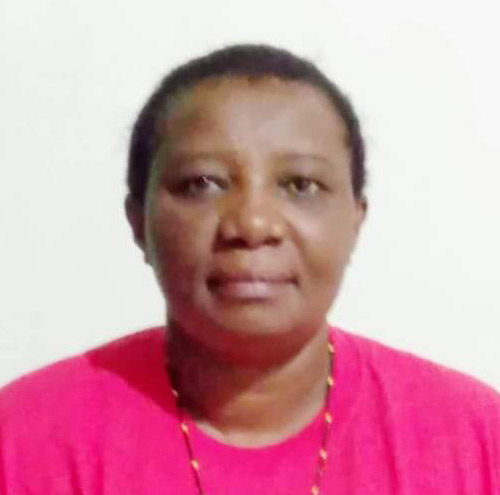 Catherine Scholastica K. Mutua is a Religious of Notre Dame of the Missions from Kenya. Her academic background was in theology and religious studies, peace and development, with certification in early childhood and Scripture. Her first ministries were in teaching nursery school and coordinating the oblates. Recently, she returned from the Philippines, where she had been living and working for 21 years, primarily involved in peace-building and development programs. She hopes to continue similar programs in the Machakos Diocese in Kenya.
Catherine Scholastica K. Mutua is a Religious of Notre Dame of the Missions from Kenya. Her academic background was in theology and religious studies, peace and development, with certification in early childhood and Scripture. Her first ministries were in teaching nursery school and coordinating the oblates. Recently, she returned from the Philippines, where she had been living and working for 21 years, primarily involved in peace-building and development programs. She hopes to continue similar programs in the Machakos Diocese in Kenya.
I worked for two years as a Religious of Notre Dame of the Missions in a conflict area in the Philippines; as the only foreigner, struggling with a new language, it was complex, messy, risky and demanding. People were seeking shelter with us in the evacuation sites — very depressing and hopeless, especially to those living in tents. But the people we worked with gave me hope — many of them young people providing food and services, and assuring our safety.
At the beginning, I was not sure if this was what I wanted to do, but the plight of those we were serving prevented me from saying another word — was my life more special than theirs?
I had to live alone, find my own food and a space for my prayer and spiritual nourishment. I did not realize that would be so demanding, and I was faced with emptiness, dryness and loneliness. Without a structured community life, I had to continue living my vocation.
The words of Jesus echoed in me: If I do not wash you, you have no part with me (John 13:1-15).
I realized that my own feet needed to be washed before I could wash others. I surrendered and, as Peter did, said, "You can wash my whole body as well."
Jesus showed us how to serve others; he did not wash them because of their worthiness, but out of love. Consumed by the spirit of God, I began washing the feet of the people in the evacuation sites — malnourished children, the old and young. I looked in their eyes and saw the same fear and helplessness I was experiencing.
mutua 2 RESIZE.jpg
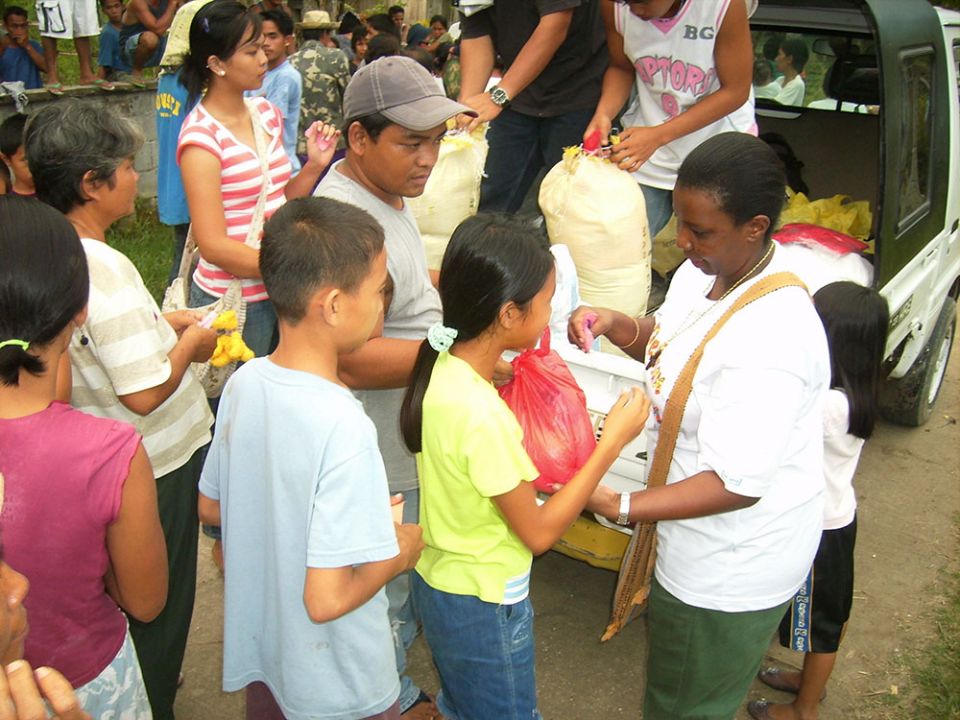
My call as a consecrated person was put to the test: My vow of poverty now involved more than material things. I was washing others' feet — men and women, Muslims, Christians and indigenous peoples — in solidarity with their suffering and sharing with them my time, my space and whatever I had.
My vow of chastity extended to whoever I met: My love crossed over to those I knew and to strangers, to whatever culture or ethnicity I was serving — all my brothers and sisters sharing the same humanity.
My vow of obedience was more than obeying leaders: It was listening to the voice of God through those I served, to their stories of fear, frustration, and how they long to send children to school without fear, have farms safe from landmines, and permanent homes safe from destruction.
Instead of holding onto our love and traditional ministries, as religious we stoop down to wash the feet of others as Jesus showed us. We can't worry about status and titles, or our own advancement — we serve others because God has put them in our lives to add value and enrich their lives.
God assures us (Proverbs 3:5-6, 9 and Luke 12:12) that he has our backs in calling us to serve his people. As religious, our purpose is to listen to God's guidance and follow his direction. We can have assurance in who we are, and whose we are, so that we can serve others whom God brings into our daily lives.
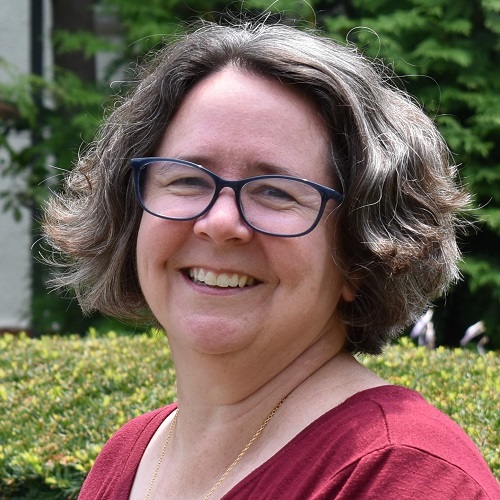 Belinda Monahan is a Benedictine Sister at St. Scholastica Monastery in Chicago. With an academic background in archaeology, anthropology and Eastern languages, she worked as an archaeologist, primarily as a faunal analyst in Armenia and the greater Near East. After making final monastic profession in 2014, she worked in parish ministry and on the executive committee of the managing board of the National Religious Vocation Conference. She currently serves as assistant campus minister at the Sheil Catholic Center at Northwestern University and as vocation minister for her community.
Belinda Monahan is a Benedictine Sister at St. Scholastica Monastery in Chicago. With an academic background in archaeology, anthropology and Eastern languages, she worked as an archaeologist, primarily as a faunal analyst in Armenia and the greater Near East. After making final monastic profession in 2014, she worked in parish ministry and on the executive committee of the managing board of the National Religious Vocation Conference. She currently serves as assistant campus minister at the Sheil Catholic Center at Northwestern University and as vocation minister for her community.
Deuteronomy 30:11-20 was the reading that my community used for my first vows as a Benedictine Sister. Although it was my choice, I do not remember why I chose it. I had originally requested another reading that had some personal meaning for me, but was told it was not appropriate and I should find another one. Whether this reading was suggested, or we had recently read it at another liturgy, I opted to use it.
At first, I resented having to substitute a new reading. But because we did use this, I found myself paying close attention when it came up after that. The more deeply I reflected on this reading, the more it spoke with me to my life with God in community.
Advertisement
Advertisement
The first thing that I noted was a relationship between the opening of the Rule of Benedict and the beginning of this passage. "Listen," the Rule instructs us, "and put [my advice] into practice."
"This command," Moses tell us, "is not too wonderous or remote." (Deuteronomy 30:11).
Each of them calls us to a personal, intimate relationship with God, reminding us that God is not hiding from us, that God wants to be known.
Later, I began to see the parallels between the later part of this passage and the penultimate chapter of the Rule. "Choose life ... that you and your descendants may live" (Deuteronomy 30:19), Moses implores us.
"Let them prefer nothing whatever to Christ and may he bring us altogether to everlasting life," the Rule tells us.
Both call us to fullness of life in God, but both also reveal that this life does not occur in isolation. Benedict insists that we are brought "altogether to everlasting life." For Moses, life in God also occurs in community. It grows out of the promises to Abraham, Isaac and Jacob and is passed down to descendants.
The more time I spent with his passage, the more it revealed to me about the life I have chosen to live with God in community. These revelations come not just in the content of the passage, but in its context as the reading for my first vows. Letting go of my frustration over my not getting my own way at my first vows liturgy helped me learn that it is when I am open to community that I am able to move closer to God.
Like what you're reading? Sign up for GSR e-newsletters!


